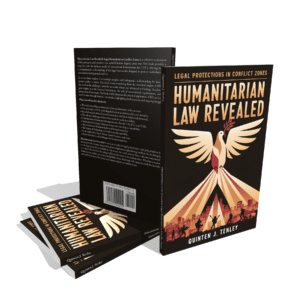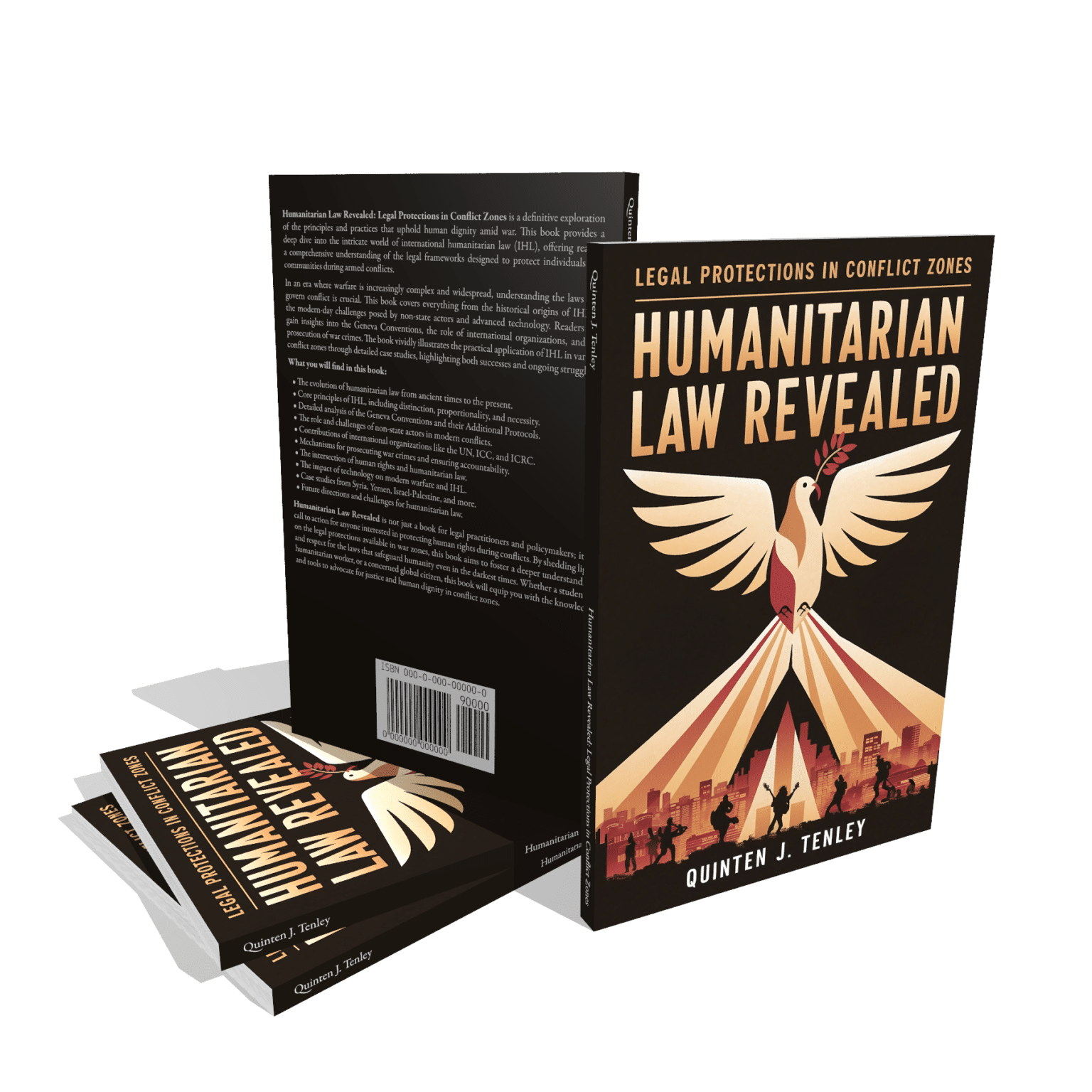Humanitarian Law Revealed: Complete Guide to Legal Protections in Conflict Zones

Understanding humanitarian law is crucial for anyone who cares about protecting vulnerable populations during armed conflicts. In today’s world of increasing global tensions and complex warfare, the legal frameworks governing conflict zones often remain misunderstood by those who need them most. This comprehensive guide by Quinten J. Tenley demystifies international humanitarian law (IHL), revealing how these essential protections function in real-world scenarios where human dignity hangs in the balance.
Unlike academic texts that focus purely on theory, this book bridges the gap between complex legal principles and practical application. Whether you’re a humanitarian worker, student, legal professional, or concerned global citizen, you’ll discover how humanitarian law serves as a beacon of hope amid the chaos of war, providing concrete tools for advocacy and understanding.
What You’ll Discover
- Master International Humanitarian Law Fundamentals: Gain comprehensive knowledge of the Geneva Conventions, their historical evolution, and how these legal frameworks protect civilians, prisoners of war, and medical personnel in conflict zones
- Navigate Complex Legal Frameworks: Learn to identify and apply humanitarian principles including distinction, proportionality, and necessity in real-world conflict resolution scenarios
- Understand War Crimes and Accountability: Discover how international courts prosecute violations of humanitarian law and what mechanisms exist to ensure justice for victims of atrocities
- Analyze Modern Warfare Challenges: Explore how non-state actors, cyber warfare, autonomous weapons, and drone technology are reshaping the application of humanitarian law
- Advocate for Vulnerable Populations: Develop practical skills to support humanitarian efforts and speak up for those caught in the crossfire of armed conflict
- Apply Case Study Insights: Examine real-world examples that demonstrate how humanitarian law functions in active conflict zones and its impact on combatant behavior
Why This Book Matters
In an era where armed conflicts affect millions globally, understanding the legal protections available to civilians and combatants isn’t just academic—it’s essential for creating a more just world. This book transforms complex international law into accessible knowledge that empowers readers to make a meaningful difference. Author Quinten J. Tenley brings an empathetic approach that honors the human impact behind every legal principle, ensuring you grasp both the letter and spirit of humanitarian law.
The practical insights provided enable immediate application whether you’re working in humanitarian aid, policy development, or simply seeking to become a more informed advocate for human rights. This knowledge becomes especially powerful when combined with real-world case studies that show how proper implementation of humanitarian law can literally save lives and preserve human dignity in the darkest of circumstances.
Key Features
This comprehensive ebook spans multiple chapters covering everything from historical context to modern technological challenges in humanitarian law application. Available as an instant digital download, you’ll receive immediate access to detailed analyses, case studies, and practical frameworks for understanding international humanitarian law. The format allows for easy reading on any device, with searchable content for quick reference during research or advocacy work. Also available as audiobook on Google Play Books and Spotify for convenient listening during commutes or while traveling to humanitarian work sites.
Frequently Asked Questions
What makes this humanitarian law guide different from academic textbooks?
Unlike dense academic texts, this book presents international humanitarian law through an empathetic lens with practical applications. Quinten J. Tenley focuses on real-world scenarios and case studies that demonstrate how legal protections actually function in conflict zones, making complex concepts accessible to humanitarian workers and advocates without extensive legal background.
Can this book help me understand modern warfare challenges like cyber attacks and drone warfare?
Absolutely. The book specifically addresses how technological advancements including autonomous weapons, cyber warfare, and drone technology are reshaping humanitarian law application. You’ll learn how traditional legal frameworks adapt to these modern challenges while maintaining core humanitarian principles of protection and accountability.
Is this suitable for someone new to international humanitarian law concepts?
Yes, this guide is designed for both newcomers and those with some background in humanitarian work. The author explains the Geneva Conventions, war crimes, and legal frameworks in clear, accessible language while providing enough depth to satisfy more experienced readers seeking practical insights for their advocacy work.
Get Your Copy Today
Transform your understanding of humanitarian law with this comprehensive guide that bridges theory and practice. Available for instant download at just $6.99, this ebook provides exceptional value compared to expensive legal courses or workshops. Also available as audiobook on Google Play Books and Spotify for flexible learning. Purchase your copy through all major ebook retailers including Apple Books, Barnes & Noble, and Kobo to begin advocating more effectively for human rights in conflict zones today.
Watch the Video Review

